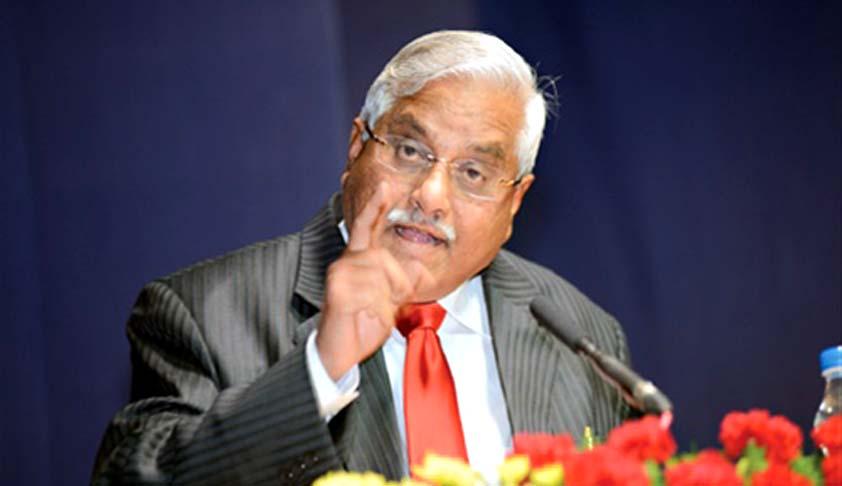Ordinances Issued by State Governors to Freeze Labour Laws Unconstitutional, Says Former SC Judge

Supreme Court judge Justice Venkate Gopala Gowda. Image Courtesy: Live Law
After the Karnataka government, taking cue from other BJP-ruled states, allegedly recommended its Governor to pass a similar ordinance to freeze most of the labour laws, former Supreme Court judge Justice Venkate Gopala Gowda penned an open letter arguing that such ordinances are unconstitutional.
Justice Gowda wrote that such an ordinance not only violated the International labour standards which India is bound by, but will also "be in blatant violation of Fundamental Rights and Directive Principles of State Policy" and "amount to forced labour".
Moreover, he stated that it "is not permissible within the law" for the Governor to pass an ordinance in direct conflict with central laws which have been passed by the Parliament with the assent of the President, unless the latter himself instructed the governor to pass such an ordinance.
Article 213(1) of the Constitution permits a governor to pass ordinances if, during a time when the state Legislative Assembly and Council are not in session, he or she feels that circumstances "render it necessary for him to take immediate action."
However, the same article which grants the governor this authority explicitly sets out the limitation that "the Governor shall not, without instructions from the President, promulgate any such Ordinance if" an Act passed by the state legislature, "containing the same provisions" as the ordinance, "would under this Constitution have been invalid unless, having been reserved for the consideration of the President, it had received the assent of the President”.In his letter, Justice Gowda argued that therefore, "Without instructions from the President of India.. the proposed Ordinance shall not be promulgated by the Governor of Karnataka...", since it is related to laws which have been enacted by the Parliament, with assent from the President. These include the Factories Act, 1948, Industrial Dispute Act, 1947, Minimum Wages Act 1948, Payment of Wages Act,1936, and Employees State Insurance Act,1948.
All the aforementioned laws fall under subjects categorised in the concurrent list under the Seventh Schedule of the Constitution, listed from serial numbers 22 to 24, namely: “Trade unions; industrial and labour disputes”, “Social security and social insurance; employment and unemployment” and “Welfare of labour including conditions of work, provident funds, employers’ liability, workmen’s compensation, invalidity and old age pensions and maternity benefits”.
Thus, given the federal structure of the Constitution, states can make laws regarding these subjects, including amendments to existing ones. However, as the former judge pointed out, these amended laws must “be in obedience with the provisions of the... Central Acts which are already legislated by the Parliament.”
Else, there will be direct conflict between laws enacted by states and those by enacted by the Centre. Article 254(1) resolves such conflicts by clarifying that “If any provision of a law made by the Legislature of a State is repugnant to any provision of a law made by Parliament.. with respect to one of the matters enumerated in the Concurrent List, then... the law made by Parliament... shall prevail and the law made by the Legislature of the State shall, to the extent of the repugnancy, be void.”
The only exception made is in Article 254(2), in cases where such an Act passed by the state legislature, or an ordinance of the governor when the legislature is not in session, “has been reserved for the consideration of the President”, following which the latter has given assent. Even this exception is qualified by a proviso there should be nothing in its content which prevents the Parliament from scrapping or amending it.
Citing a long line of jurisprudence in favour of his argument, dating back to 1959, Justice Gowda concluded: “The Governor is not empowered to issue the Ordinance where the Bill is required to be reserved for assent of the President.”
Even in case the Karnataka Governor reserves the ordinance for presidential assent, the assent itself “is not automatic and should be with due application of mind, keeping in view the binding precedents... laid down by both Constitution Bench and other Benches”, he argued, stressing that the precedents set by these judgments are “binding on everybody including the President and the Governor.”
Get the latest reports & analysis with people's perspective on Protests, movements & deep analytical videos, discussions of the current affairs in your Telegram app. Subscribe to NewsClick's Telegram channel & get Real-Time updates on stories, as they get published on our website.
























